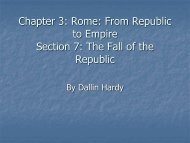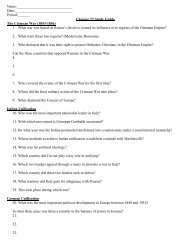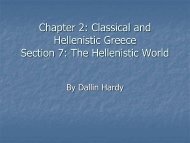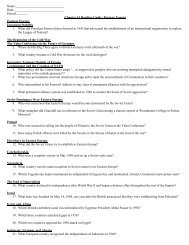Rome's Dark Night of Tyranny
Rome's Dark Night of Tyranny
Rome's Dark Night of Tyranny
Create successful ePaper yourself
Turn your PDF publications into a flip-book with our unique Google optimized e-Paper software.
F<br />
il, a::<br />
ff<br />
i1<br />
e's <strong>Dark</strong> <strong>Night</strong> <strong>of</strong> <strong>Tyranny</strong><br />
blic fell, Rome entered the dark decline <strong>of</strong> empire. Only after centuries <strong>of</strong><br />
predominantly tyrannical emperors did Rome finally meet its end.<br />
n<br />
J<br />
the lourth century <strong>of</strong> our era. the<br />
Danube<br />
I<br />
River marked the northern<br />
I frontier <strong>of</strong> the Roman Empire. To the<br />
north and east <strong>of</strong> the Danube, fierce Germanic<br />
and Scythian tribes roamed to the<br />
edges <strong>of</strong> the known world. Beyond them<br />
- according to the uncertain traditions <strong>of</strong><br />
the ancients - lay a savage, frozen wilderness<br />
populated by the likes <strong>of</strong> the Geloni,<br />
who dressed in the skins <strong>of</strong>their slain<br />
enemies, and the Melanchlaenae, who fed<br />
on human flesh.<br />
Immediately to the north <strong>of</strong> the eastern<br />
Danube were vast settlements <strong>of</strong> Goths,<br />
who by the mid-370s found themselves<br />
threatened by invading Huns and Alans<br />
from the east. To escape the ravaging barbarians<br />
from the hinterlands, the Goths<br />
fled en masse to the banks <strong>of</strong> the Danube<br />
and sent envoys to the Roman emperorValens,<br />
begging for permission to cross into<br />
Roman territory to escape the marauding<br />
hordes, and to settle in the province <strong>of</strong><br />
Thrace. Valens, persuaded <strong>of</strong> the need for<br />
a mercenary and labor force to fortify and<br />
protect the northern boundaries <strong>of</strong> the empire,<br />
and anxious to expand his tax base,<br />
made one <strong>of</strong> the most fateful decisions in<br />
all <strong>of</strong> history: he opened the borders <strong>of</strong> the<br />
empire and invited the Goths to immigrate<br />
to Roman territory.<br />
With the help <strong>of</strong> boats furnished by<br />
the Romans, the Goths poured across the<br />
Danube into Roman territory - "like lava<br />
from Etna," in the words <strong>of</strong> Roman historian<br />
Ammianus Marcellinus - and set<br />
up encampments in Thrace. The occupying<br />
population was estimated by Edward<br />
Gibbon to have numbered at least 200,000<br />
fighting men and up to a million total immigrants.<br />
The Romans immediately took<br />
advantage <strong>of</strong> the situation by bartering<br />
food and other necessaries (including, supposedly,<br />
spoiled dog meat) to the desperate<br />
Goths, in exchange for slaves. The Goths<br />
resented such treatment and soon rebelled<br />
against the Roman authorities. Before too<br />
many months, the Goths, led by their crafty<br />
general, Fritigern, were pillaging and laying<br />
waste to cities all across Thrace.<br />
Ilisaster at Hadrianople<br />
After several bloody and indecisive battles,<br />
the Roman emperor Valens himself<br />
THE NEW AMERICAN . FEBRUARY 7. 2005
decided to intervene. He marched north at<br />
the head <strong>of</strong> an enormous army that represented<br />
much <strong>of</strong> the military might <strong>of</strong><br />
Rome and encountered the Gothic army<br />
- which by now was strengthened by<br />
Alan and Hun auxiliaries - outside the<br />
city <strong>of</strong> Hadrianople. Hadrianople, the "city<br />
<strong>of</strong> Hadrian," was named for the emperor<br />
best remembered for his efforts to fortify<br />
another Roman frontier, the boundary between<br />
Roman and Celtic Britain known<br />
as "Hadrian's Wall." But on August 9,<br />
378 A.D., the plains outside the city <strong>of</strong><br />
Hadrian witnessed the battle that brought<br />
the Roman Empire to her knees.<br />
Valens and his forces advanced confidently<br />
against the howling barbarian<br />
host, only to be outflanked and outfought<br />
by the furious Goths, who had cleverly<br />
postponed the engagement until the heat<br />
<strong>of</strong> the day, when the Romans were weakened<br />
and dehydrated. Crushed together by<br />
the furious onslaught, the Romans, unable<br />
to maneuver or even use their swords and<br />
javelins, were slaughtered like cattle. By<br />
the end <strong>of</strong> that terrible day, the flower <strong>of</strong><br />
the Roman military had been cut down,<br />
including 35 tribunes, many distinguished<br />
generals, and Valens himself, whose body<br />
was never recovered. With them fell<br />
somewhere between 50,000 and 100,000<br />
lir"<br />
H.<br />
i<br />
, l,'<br />
7<br />
ot<br />
THE NEW AMERICAN o FEBRUARY 7. 2OO5<br />
ria<br />
Roman soldiers, or up to 80<br />
percent <strong>of</strong> the entire existing<br />
Roman military force.<br />
Not since Cannae in the<br />
By the end 0f the first Gentury A.0., even<br />
the architectural remnanls <strong>of</strong> republican<br />
Second Punic War had Rome<br />
suffered such a disaster. But<br />
unlike Cannae, which be-<br />
Rome had been swept away by the fires<br />
that had scoured the city. The Senate still<br />
came a rallying point for republican<br />
Rome, Hadrianople<br />
shattered the empire beyond<br />
existed in name, and would persist for<br />
several centuries, but old Rome had been<br />
repair. Over the next few decades,<br />
the empire was swept<br />
away by successive invasions<br />
consumed in the holocaust <strong>of</strong> empire.<br />
<strong>of</strong> barbarians eager to take advantage <strong>of</strong> ever, a symptom, not a cause, <strong>of</strong> Rornan ,'<br />
<strong>Rome's</strong> undefended borders. imperial decline. In historical hindsight,<br />
Within 30 years <strong>of</strong> the disaster in Thrace, the longevity <strong>of</strong> the Roman Empire was<br />
Alaric and his Gothic horde were besieging extraordinary, given the centuries <strong>of</strong> altheEternalCity.By<br />
429A.D.,theVandals most unrelenting tyranny, warfare, ecowere<br />
pouring into Roman North Africa, nomic decay, and even natural disasters<br />
and in 455 they sacked Rome itself. At- that ravaged the once-proud Roman dotila<br />
and his Huns, most formidable <strong>of</strong> all,<br />
ovenan much <strong>of</strong> Greece, Italy, and Gaul in<br />
minions. That the weary denizens <strong>of</strong> the<br />
empire could have enduied so many gen- '.:<br />
the early decades <strong>of</strong>the fifth century. leav- erations <strong>of</strong>grinding tyranny is a testimony<br />
ing desolation in their wake. Well could to human endurance. But more'than a few<br />
Romans. by the mid-fifth century. lament may have felt a sense <strong>of</strong> relief at the colthe<br />
fateful decision <strong>of</strong> a weak and foolish lapse <strong>of</strong> their imperial op?ressors.<br />
emperor. and what Ammianus mournfully The Roman Empire proper began with<br />
called the "tumultuous eagerness <strong>of</strong> those Octavian. better known as CaesarAugustus<br />
who urged on the proceedings [that] led to who initially. after the assassination <strong>of</strong> Juthe<br />
destruction <strong>of</strong> the Roman world." lius Caesar, alted himself withMarkAnto-<br />
The disaster at Hadrianople was, how- ny and Lepidus to defeA!,the,l'q$republican<br />
.,:,'<br />
3i<br />
I
Tiberius set up a massive<br />
The Roman loss at Hadrianople<br />
network <strong>of</strong> informers' and<br />
shafiered rhe empire beyond repa:r. ffi'"'.""*:H#*""itffiTd#<br />
Within 30 yearS Of lhis diSaSter, AlariC<br />
high treason, and punishable<br />
and his Gorhic horde were besiesins rhe Y.,l;i:x. i:j1i'#,F"XH::11:<br />
Eternal Gity. By 429 A.0., the Vandals Roman Republic into a miliwere<br />
pourins inro Roman North Africa, :xi:::i:T"1t?;lTffi["'<br />
and in 455 they Sagked ROme.<br />
Inldditinn to his political<br />
:Jff Y;#'"TT,Li,ll,xi'ii5<br />
army at Philippi, led by Cassius and Brutus.<br />
, After 10 years <strong>of</strong> rivalry he forced Lepidus<br />
. ' numbers <strong>of</strong> captive children to gratify<br />
his twisted whims.<br />
Tiberius, like most <strong>of</strong> <strong>Rome's</strong> emperors,<br />
met a violent end. Having fallen severely<br />
ill, he was suffocated by certain<br />
<strong>of</strong> his attendants after partly recovering<br />
from a bout <strong>of</strong> illness that had been expected<br />
to claim his evil life. He was succeeded<br />
by Gaius Germanicus, also known<br />
as Caligula, a man whose perversions and<br />
despotic behavior have always taxed the<br />
credulity <strong>of</strong> modern historians. Caligula<br />
carried on incestuous relationships with<br />
be believed, was a depraved monster in his three sisters. He had numerous ho-<br />
into retirement and defeated Mark Antony<br />
his private life. A recitation <strong>of</strong> the details<br />
<strong>of</strong> Tiberius'private life would appall and<br />
mosexual partners and forced adulterous<br />
liaisons with many <strong>of</strong> <strong>Rome's</strong> most illus-<br />
..,,;,, and his Egyptian allies led by Cleopatra at<br />
..','the naval battle <strong>of</strong> Actium.<br />
sicken the reader; it is enough to record<br />
that Tiberius was an enthusiastic and intrious<br />
women.<br />
Caligula took full advantage <strong>of</strong> the po-<br />
After Actium, Augustus' subsequent satiable practitioner <strong>of</strong>every base sexual lice-state apparatus founded by his prede-<br />
,.1l t"tgtt <strong>of</strong> more than 40 years was a compar-<br />
,'r'''atively<br />
tranquil one, in spite <strong>of</strong><br />
depravity known, and even kept vast cessor to unleash a reign <strong>of</strong> terror unsurpassed<br />
(though <strong>of</strong>ten matched)<br />
atrocities,,committed by certain<br />
in imperial Roman history. A<br />
<strong>of</strong> his impeiial subordinates,like<br />
brief excerpt from Suetonius'<br />
the Judean tetraJch Herod. But<br />
lengthy and horrifying descrip-<br />
with the death <strong>of</strong> Augustus in<br />
tion <strong>of</strong> Caligula's reign will give<br />
14 A.D., a new type <strong>of</strong> monarch<br />
the reader an idea <strong>of</strong> Rome under<br />
assumed the scepter in Rome,<br />
embodied in Augustus' adopted<br />
Caligula's administration:<br />
son Tiberius.<br />
Gaius made parents attend<br />
<strong>Dark</strong>ness Falls<br />
Tiberius,likenearly all <strong>of</strong> his imperial<br />
successors, was a monster.<br />
T.JEIlU<br />
*_<br />
their sons' executions, and<br />
when one father excused<br />
himself on the ground <strong>of</strong> ill<br />
health, provided a litter for<br />
"If we were to draw a picture <strong>of</strong><br />
his life," wrote the Abb6 Millot,<br />
a histodan held in high esteem by<br />
1<br />
+4.:<br />
him.... A knight, on the point<br />
<strong>of</strong> being thrown to the wild<br />
beasts, shouted that he was<br />
the Arderican Founding Fathers,<br />
innocent; Gaius brought him<br />
"we might say thathe knew what<br />
back, removed his tongue,<br />
was good. and <strong>of</strong>ten commanded<br />
and then ordered the sentence<br />
it, but,:the general tenor <strong>of</strong> his<br />
to be carried out.... The meth-<br />
conduct was to'do evil with cool<br />
deliberate malevolence." One<br />
<strong>of</strong> Tiberius' first acts in <strong>of</strong>fice<br />
was to order the assassination<br />
<strong>of</strong> Agrippa, the son <strong>of</strong> Augustus'<br />
E.-<br />
L il.,'. ,r<br />
*#a{ ':.<br />
od <strong>of</strong> execution he preferred<br />
was to inflict numerous small<br />
wounds; and his familiar<br />
order: "Make him feel that he<br />
is dying!" soon became pro-<br />
most famous adviser <strong>of</strong> the same<br />
name. He was also accused <strong>of</strong><br />
'a=<br />
!€<br />
''::!€<br />
::<br />
':.!<br />
verbial.<br />
orderingthe murder <strong>of</strong> Germani-<br />
"Let them hate me, so long as<br />
cus. a Roman military leader <strong>of</strong><br />
they fear me," Caligula is al-<br />
$eat integrity who had successleged<br />
to have <strong>of</strong>ten said. On one<br />
well-known occasion, Caligula,<br />
angry at crowds cheering a team<br />
stead. But<br />
emperor's gratiicus'<br />
popularity<br />
people,.earned<br />
'bittei<br />
envy.<br />
he opposed, publicly wished that<br />
Rogues' gallery: 0f these first-century Roman leaders, only all Romans had but one neck to<br />
Germanicus and Augustus were not total monsters. Tiberius, sever. He terrorized Romans <strong>of</strong><br />
Caligula, and Nero in particular were among the most bestial princes every social class, delighting in<br />
history has ever produced.<br />
mass executions <strong>of</strong> senators and<br />
THE NEW AMEBICAN o FEBRUARY 7, 2OO5
in having prisoners tortured in his presence the practices <strong>of</strong> civilized rule that had<br />
during mealtime. His enatic behavior sug- characterized theAugustan period, and he<br />
gests what Suetonius and others have con- lowered taxes dramatically. However, he<br />
cluded, that Caligula was clinically insane. soon began spending extravagant sums on<br />
Caligula was assassinated after tenorizing lavish games and other public entertain-<br />
Rome for nearly four years.<br />
ment extravaganzas.<br />
He was succeeded by Claudius, another His penchant for monstrous personal<br />
monster, somewhat less bloodthirsty, but vices gradually gained the upper hand. All<br />
fickle and depraved nonetheless. Claudius <strong>of</strong>the perversions <strong>of</strong>his predecessors were<br />
appears to have been <strong>of</strong> subnormal intel- Nero's stock in trade. Suetonius accuses<br />
ligence, which made him susceptible to him <strong>of</strong> committing frequent incest with<br />
manipulation by amoral power-mongers his mother Agrippina, <strong>of</strong> raping a vestal<br />
like his appalling wife Messalina. virgin, and <strong>of</strong> attempting to convert one <strong>of</strong><br />
his young male consorts into a woman by<br />
Dean <strong>of</strong> Deptavity<br />
mutilating him and forcing him to undergo<br />
Claudius, who was finally poisoned by as- a wedding in bridal attire. And these, if<br />
sassins, was followed by another bestial Suetonius is given credibility, were among<br />
personage whose name, like that <strong>of</strong> Adolf his milder vices.<br />
Hitler, has become virtually synonymous His bloodlust turned Rome into a hor-<br />
with wanton dictatorial cruelty: Nero. ror show for 14 awful years. In addition<br />
Nero was a man <strong>of</strong> many gifts. He had an to murdering many members <strong>of</strong> his own<br />
aptitude for the arts and was an accom- family, including his mother and aunt,<br />
plished musician. He was a man <strong>of</strong> con- Nero continued the reign <strong>of</strong> terror <strong>of</strong> his<br />
siderable charisma and had a photographic predecessors in emphatic style. The best-<br />
memory for names and faces. His reign known episode in his misbegotten rule, the<br />
started promisingly; he pledged to restore great conflagration that destroyed Rome,<br />
was quite possibly his own doing, although<br />
the historical evidence for that is inconclusive.<br />
What seems beyond dispute was that<br />
he reveled in the desluction and played his<br />
lyre as the Etemal City went up in flames.<br />
Persecutions and Powel Faetions<br />
In the aftermath, Nero encouraged the<br />
belief that members <strong>of</strong> a new religion.<br />
Christians. were to blame, and launched<br />
the most horrific large-scale persecutions<br />
that Christianity had yet seen. [n the<br />
words <strong>of</strong> Tacitus. "an immense multitude<br />
l<strong>of</strong> Christiansl was convicted. not so much<br />
<strong>of</strong> the crime <strong>of</strong> firing the city, as <strong>of</strong> hatred<br />
against mankind. Mockery <strong>of</strong> every sort<br />
was added to their deaths. Covered with<br />
the skins <strong>of</strong> wild beasts. they were torn by<br />
dogs and perished, or were nailed to the<br />
crosses. or were doomed to the flames and<br />
burnt. to serve as a nightly illumination.<br />
when daylight had expired."<br />
Nero's behavior finally brought about<br />
armed revolt, led by Galba, who marched<br />
on Rome in 68 A.D. Nero committed suicide<br />
as Galba's forces closed in. Rome for<br />
Mass martyrdom: The emperor Nero publicly blamed Christians for the great fire that destroyed Rome in 64 A.D: --:aJrre<br />
'i<br />
he may<br />
r;<br />
At his orders, thousands <strong>of</strong> Christians were burned alive all across the citv.<br />
THE NEW AMERICAN . FEBRUARY 7. 2005<br />
!
human history. Even the archi-<br />
Much has been made<br />
lecturalremnants <strong>of</strong> republican<br />
<strong>of</strong> the decline and<br />
Rome had been swept away by<br />
fall <strong>of</strong> the empire, butthe real storywas rhe fires thar had scoured the<br />
the decline and fall <strong>of</strong> the republic. The<br />
citv'.and everv last'esrige <strong>of</strong><br />
;;u ; rrpin;i* to,rfonr"oiriurioi, ;""11ifiil'ilF#1;il:Tfi:<br />
but the causes leading to the decline and in name.<br />
ii:.:l'f:l:ted and<br />
ture, including the writings <strong>of</strong> Plutarch<br />
and Tacitus. It was this period that Gibbon<br />
chose as his point <strong>of</strong> departure in his<br />
famous History <strong>of</strong> the Decline and Fall <strong>of</strong><br />
the Roman Empire - amisleading starting<br />
point to support his mistaken premise that<br />
the early empire represented the pinnacle<br />
<strong>of</strong> Roman achievement. Calling the empire<br />
-u<br />
"the most civilized portion <strong>of</strong> mankind,"<br />
ran or repubrics por, vexins probtem IiU fl:T*il'iJ;:il:::;l; Gibbon went on to extol <strong>Rome's</strong> "disci-<br />
that man has not yet fully fathomed. 91d.ngm3<br />
had been consumedplined<br />
valor," "peaceful inhabitants," "free<br />
in the holocaust <strong>of</strong> empire. constitution," and "gentle, but powerful,<br />
Beginnlng with the em- influence <strong>of</strong> laws and manners." Howevthe<br />
next several years was the scene <strong>of</strong> peror Nerva and continuing with Trajan, er, Rome during this comparatively placid<br />
unending slaughter and civil war. as lhree Hadrian, Antoninus, and Marcus Aurelius, interval was still a decrepit civilization <strong>of</strong><br />
more bloodthirsty tyrants - Galba, Otho. imperial Rome from the late first century unending foreign wars and conquests, <strong>of</strong><br />
and Vitellius until the death <strong>of</strong> Marcus Aurelius in 180 palace intrigue, and <strong>of</strong> the debased mor-<br />
A.D. enjoyed a brief sunlit interlude that als that had incubated the likes <strong>of</strong> Caligula<br />
saw the flowering <strong>of</strong> Christianity and the<br />
production <strong>of</strong> many great works <strong>of</strong> litera<strong>of</strong><br />
terrified citizens cut down by<br />
and Nero. The virtues <strong>of</strong> Nerva, Trajan,<br />
Hadrian, and the two Antonines appear<br />
magnified by the faults <strong>of</strong> their<br />
predecessors. But with the death<br />
<strong>of</strong> MarcusAurelius, <strong>Rome's</strong> lucky<br />
streak ended.<br />
Empireb End<br />
Marcus Aurelius was succeeded<br />
by his son Commodus, another<br />
bestial ruler cast from the same<br />
mold as Nero, with the same vices<br />
and insatiable appetite for cruelty.<br />
He was eventually strangled by a<br />
gladiator in the employ <strong>of</strong> a palace<br />
conspiracy.<br />
And so it went. For the next<br />
several hundred years, the Roman<br />
Empire was strained to the breaking<br />
point by civil wars, foreign<br />
adventures, heavy taxation, and<br />
constant political turmoil. Emperor<br />
succeeded emperor, usually by<br />
rivals,<br />
violence. For each tolerable ruler<br />
had endured<br />
- a Diocletian, Pertinax, Constantine,<br />
or Julian - there were<br />
a dozen monsters, such as Caracalla,<br />
Elagabalus, Maximin, Valens,<br />
and others far too numerous<br />
to merit mention. Most <strong>of</strong> them<br />
slashed their way to the top, only<br />
to be deposed in bloody coups<br />
within weeks or months <strong>of</strong> accession<br />
to the purple. And even the<br />
Rome vandalized: Led by the fearsome Genseric, the Vandals,<br />
a Germanic tribe that had already wrested lberia and North<br />
best were deeply flawed or com-<br />
Africa from the Roman Emoire. sacked and burned Rome mitted unpardonable atrocities.<br />
itself in 455 A.D. After ceniuries <strong>of</strong> impregnability, Rome was Constantine the Great, despite<br />
now experiencing the same horrors her legions had so <strong>of</strong>ten establishing Christianity as the<br />
:inflicted on others.<br />
<strong>of</strong>ficial religion <strong>of</strong> Rome, was ca-<br />
- succeeded to the purple by<br />
violent overthrow. Tacitus gives vivid descriptions<br />
<strong>of</strong> Rome ravaged by fire and the<br />
: y-"-'d,1c-1 o u'und'<br />
",1 I_d :i1.li 119.:f,th<br />
successive power factions. Suetonius,<br />
never one to mince words.<br />
complements Tacitus' account<br />
with his usual revolting personal<br />
portraits <strong>of</strong> these men.<br />
It was during this period that<br />
the Roman military acquired a<br />
habit it was seldom to relinquish<br />
for the remainder <strong>of</strong> the empire:<br />
proclaiming emperors solely on<br />
the authority and whim <strong>of</strong> the<br />
soldiers. Unlike later European<br />
monarchies, imperial Rome (as<br />
well as its successor regime in<br />
the east, Byzantiuml never develthagre<br />
sulted,,in<br />
tho:emple'arid<br />
;,:i<br />
THE NEWAMERICAN . FEBRUARY 7,2OO5
pable <strong>of</strong> remarkable acts <strong>of</strong> cruelty, which<br />
included having his own wife and son put<br />
to death. Julian, nicknamed "the Apostate,"<br />
was a brilliant and able leader, but<br />
chose to persecute Christians and to wage<br />
unprovoked war on the Persian empire,<br />
where he died <strong>of</strong> battle wounds during the<br />
retreat from Ctesiphon, the Persian capital.<br />
Pertinax, who followed Commodus, seems<br />
to have been a genuinely virtuous man.<br />
He attempted to restore Senate authority,<br />
transferred all his personal property to<br />
his wife and son to avoid the reproach <strong>of</strong><br />
personal enrichment, and overturned the<br />
unjust decrees <strong>of</strong> his predecessor. Unfortunately,<br />
this decent man was murdered by<br />
his own Praetorian guards after less than<br />
three months as emperor. Imperial Rome<br />
was beyond repair and no longer suited to<br />
virtuous leadership.<br />
Diocletian, who reigned for 20 years.<br />
divided the empire for the first time. a division<br />
that became permanent in the midfourth<br />
century in the time <strong>of</strong> Valentinian<br />
I and Valens. At about this same time.<br />
in July 365 A.D., the Roman world was<br />
literally shaken by an unprecedented catastrophe.<br />
An immense earlhquake struck<br />
the greater paft <strong>of</strong> the Mediterranean basin<br />
and was followed by gigantic tsunamis<br />
that wiped out much <strong>of</strong> coastal Sicily,<br />
Dalmatia, Greece, and Egypt. The great<br />
city <strong>of</strong> Alexandria was nearly wiped out,<br />
losing 50,000 inhabitants. This event filled<br />
the Roman world, pagans and Christians<br />
alike, with constemation, as the very powers<br />
<strong>of</strong> nature now seemed to be unleashed<br />
against the dying Roman world. Thirteen<br />
years later came the calamitous battle <strong>of</strong><br />
Hadrianople, the event that traditionally<br />
marks the beginning <strong>of</strong> the <strong>Dark</strong> Ages.<br />
After Hadrianople, predatory barbarian<br />
tribes were quick to pounce on the<br />
enfeebled Roman world, and by the late<br />
frfth century, the last remnant <strong>of</strong> the Western<br />
Roman Empire was conquered by<br />
the Goths and other tribes. Many <strong>of</strong> the<br />
Germanic tribes, most conspicuously the<br />
Goths, did possess a certain rustic virtue,<br />
enhanced by their Arian Christian beliefs.<br />
For the Serious Student<br />
THE NEW AMERTCAN . FEBRIJARY 7. 2005<br />
Gothic rulers <strong>of</strong> former Roman dominions,<br />
like Theodoric and Totila, were fairly just<br />
and humane rulers compared to the morally<br />
bankrupt Romans. and many former<br />
imperial citizens were happy to submit<br />
to these gentler masters. Meanwhile, the<br />
eastern empire lived on, with its capital<br />
at Constantinople and its distinctly Greek<br />
and Asiatic character. for another thousand<br />
years.<br />
Thus did Rome die, more than 1,300<br />
years after the founding <strong>of</strong> the city by Ro- ,<br />
mulus and his band <strong>of</strong> followers. Following .<br />
Gibbon. much has been made <strong>of</strong> the decline<br />
and fall <strong>of</strong> the empire. but the real story.<br />
which had concluded by the time <strong>of</strong>, Christ.<br />
was the decline and fall <strong>of</strong> the republic. For -<br />
the fall <strong>of</strong> empires is aforegone conclusion;'<br />
they are always built on loundations <strong>of</strong> sand<br />
- despotism. militarism, expansionism.<br />
and welfarism - and soon exhaust themselves,<br />
or are dismembered by other powers.<br />
But the causes leading to the decline<br />
and fall <strong>of</strong>republics pose al,exing problem<br />
that man has not yet fully fathomed. I<br />
irect documentation <strong>of</strong> the Roman Empire and its decline Finally, no discussion <strong>of</strong> Roman sources would be complete with-<br />
is surprisingly sparse. The best sources for the first century out reference to the veaerable Edward,Gibbon; whose massive Ilis-<br />
A.D., Tacitus and Suetonius, both make grim if informatory <strong>of</strong> the Decline and FaIl <strong>of</strong> the Roman Emphe remains, more than<br />
tive reading. Tacitus, lauded by many as the best Roman historian two centuries after its original publicatioi, the most comprehensive<br />
for his concision, attention to detail, and reiiability, is a must-read such history. and perhaps the grealest historical Lreatise on any sub-<br />
for anyone wanting a dispassionate account <strong>of</strong> Roman culture and ject ever written. That said. the authority <strong>of</strong> Cibbon is <strong>of</strong>ten over-<br />
politics at the beginning <strong>of</strong> the Christian era. The surviving portions drawn. His obvious command <strong>of</strong> the facts and copious documenta-<br />
<strong>of</strong> Tacitus'two magisterial works on Roman history, The Annals and tion are <strong>of</strong>ten overshadowed by his pompous tone, ov..ur. <strong>of</strong>certain<br />
The Histories, are available complete in a Modern Library Classics stock words and phrases, and blatant hostility to Christianity. All<br />
paperback edition.<br />
writers are entitled to their prejudices. <strong>of</strong> course. bul Gibbon attri-<br />
Tacitus' scandalous counterpart, Suetonius, is not for all tastes. butes the fall <strong>of</strong> the Roman Empire largely to the rise <strong>of</strong> Christianity.<br />
Where Tacitus draws a curtain <strong>of</strong> discretion over the baser acts <strong>of</strong> There is ample reason to ruppoi. instead that Christianity anificialiy<br />
his subjects, Suetonius unstintingly describes perversities that would prolonged the life <strong>of</strong> an otherwise moribund state. It was cerlainly<br />
make even some modern pornographers squirm with unease. The the case that Byzantium, the heir <strong>of</strong> the Eastem Empire, lacked any<br />
reader <strong>of</strong> Suetonius' The Twelve Caesars, available complete in a semblance <strong>of</strong> good government, and was preserved mostly by the i<br />
Penguin Paperbacks edition, must be prepared for an utterly candid vitality ol her laith.<br />
view <strong>of</strong> diabolical levels <strong>of</strong> personal comrption. If nothing else, Sue- Nor was Gibbon any great champion <strong>of</strong> republican virtue and libtonius<br />
is the most devastating testimony ever written <strong>of</strong> the dangers erty. He, like many elites <strong>of</strong> his age, was awed by empire and cared<br />
inherent in unlimited govemment power.<br />
little for the bucolic virtues <strong>of</strong> early Rome. As a consequence Gibbon,<br />
The last true Roman historian was Ammianus Marcellinus, who despite the canonical status he now enjoys, was very controversial<br />
chronicled the events <strong>of</strong> his lifetime, many <strong>of</strong> which he witnessed. both in America and in Europe when his *ork was first pubJished.<br />
A pr<strong>of</strong>essional soldier, he participated in Julian's disastrous Persian Many early Americans prefer-red the now-forgotten world history <strong>of</strong><br />
campaign. He lived to see the virtual destruction <strong>of</strong> the Roman Em- the Frenchman Abb6 Millot, a less monumental work but infinitelv -*l<br />
pire, and his history concludes with a vivid description <strong>of</strong> the Battle friendlier to republican values than Gibbon. In surn, Gibbon is with"-<br />
<strong>of</strong> Hadrianople. The Penguin Paperbacks edition <strong>of</strong> his history is out parallel as a source <strong>of</strong> raw information, but less reliable as an<br />
nearly complete, but a few passages have been removed for editorial intelpreter <strong>of</strong>the events he chronicled' I<br />
feasons.<br />
- Srnvs BoNra<br />
41,.'<br />
lj













